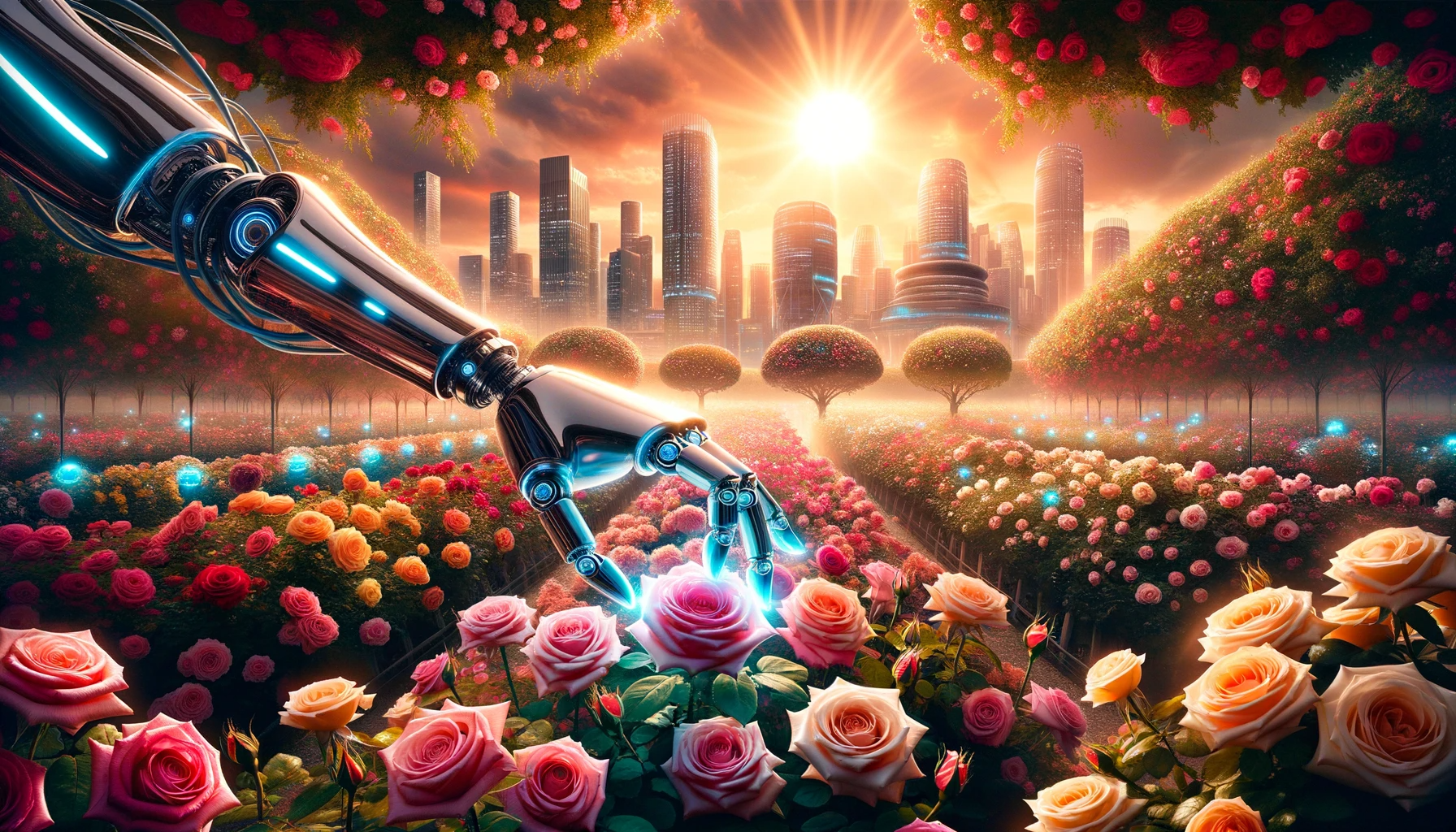Everything's Coming Up AI Roses

TRIGGER WARNING! This post paints AI in a largely positive way. Readers who feel threatened by positive outlooks may want to avoid this one.
Too often, discussions about AI's future pit humanity against machine, as if preparing for some cataclysmic showdown. Yet, this perspective fails to recognize the symbiotic relationship that could exist between humans and AI. Think of it as a partnership where each party elevates the other. AI can help us tackle some of the most pressing challenges we face—war, climate change, pandemics, nuclear threats, and environmental degradation. In return, human creativity, and ethical frameworks, can guide AI towards responsible and beneficial applications.
You know, the more I think about it, the more I realize that the potential of AI to improve our lives is just staggering. Take healthcare, for example. We're talking about diagnostic tools that are getting so advanced, they can pick up on diseases like cancer or diabetic retinopathy way before any human could. Imagine the lives saved, the suffering prevented.
AI was used to design and optimize vaccine candidates against COVID-19, where researchers used machine learning algorithms to predict the structure of the SARS-CoV-2 spike protein and design vaccine candidates that could target this protein. And then, AI has been used to design and conduct clinical trials for COVID-19 vaccines. For example, AI algorithms were used to identify potential participants for clinical trials, to design the trial protocol, and to analyze data from the trial. The way we develop drugs is getting a turbo-boost from AI.
Have you heard about AlphaFold? This is where things get really exciting. It's this AI system that's basically cracked the code on protein folding, a problem that's stumped scientists for decades. Understanding how proteins fold is an insanely difficult task, one that is critical for everything from drug discovery to treating diseases. Before AlphaFold, determining the structure of a single protein could take human scientists years or even decades. And here comes AlphaFold, waltzing into the scene and solving this intricate puzzle like it's a Sunday crossword. The medical breakthroughs that could come from this are mind-boggling. We could be talking about new treatments for Alzheimer's, cancer, you name it. This isn't just a step forward; it's a quantum leap.
Okay, let's talk about antibiotics. You've probably heard that we're running into a wall with drug-resistant bacteria, right? It's becoming a real crisis. Enter Halicin, a new antibiotic discovered with the help of machine learning algorithms sifting through a massive database of chemical compounds. Halicin, it turns out, is effective against strains of bacteria that have stumped other antibiotics. It's like finding a new key to a lock that no one could open. This could be a game-changer in the fight against antibiotic-resistant bacteria. Once again, AI is showing us that it can be a lifesaver, quite literally.
Fun fact, Halicin was named after HAL 9000, the computer from "2001: A Space Odyssey". Feel free to remind me that HAL did, in fact, kill off all but one of the entire crew of the Discovery.
Now, let’s hop into a sleek and futuristic car, shall we? Not just any ordinary car, but a cutting-edge self-driving vehicle that is revolutionizing the way we travel. Yes, I understand that self-driving cars are still in the testing phase, but let’s take a moment to ponder the extraordinary possibilities that lie ahead. Imagine a world with fewer accidents, where human error (not to mention, road rage) becomes a thing of the past. Picture an advanced artificial intelligence system seamlessly managing our traffic systems, transforming our daily commutes into stress-free journeys. This incredible technology is not merely a figment of our imagination; it is an incredible reality that is unfolding right before our eyes.
And speaking of the real world, what about our kids' classrooms? AI is making headway there, too. Gone are the days when traditional classrooms were the sole medium of learning; AI is steadily infiltrating these spaces as well. Imagine, if you will, a revolutionary concept where educational tools are seamlessly integrated with AI technology, enabling them to adapt and cater to each student’s unique learning style. That's not just cool; that's transformative. The one-size-fits-all model of education is becoming obsolete. Picture a world where every kid gets the education that's just right for them. Feels like a great place to start leveling up a society, doesn't it?
What? You never get sick, you don't drive, and you don't have kids in school? Fine. Let's talk about something we all care about—the planet. AI is stepping up here as well. Smart grids are optimizing how we distribute and consume energy, which is not just cost-effective but environmentally responsible. It's a win-win. Plus, we're seeing AI come into our homes, adjusting temperatures and lighting to be just right while minimizing waste. Eco-friendly and comfy? Sign me up.
Now, financial sectors aren't exactly everyone's cup of tea, certainly not mine, but if you're into that, there are fascinating things happening there as well. Think about all the mundane stuff—data entry, compliance checks—that AI can take off our hands, freeing people up to do more nuanced work. Predictive analytics are helping investors make smarter choices, while AI-driven robo-advisors are dishing out personalized investment tips. Even fraud detection has gotten a boost, from cybersecurity threats, to data privacy, and to regulatory compliance. Portfolio management? AI is crunching numbers in ways that even the most experienced human brokers couldn't dream of. It's like having a financial guardian angel looking over your shoulder. Sort of. Again, not really my thing.
The industrial and manufacturing sectors are also also getting a facelift. Picture a future where the occurrence of equipment downtime is nearly nonexistent due to the remarkable capabilities of artificial intelligence, which can accurately forecast when a machine is on the verge of malfunctioning. This not only ensures continuous operations but also boosts productivity and minimizes disruptions. Moreover, the implementation of AI-powered quality control mechanisms guarantees higher levels of customer satisfaction, as faulty products are effectively prevented from reaching the market.
The optimization of the supply chain is another significant aspect of this transformation. Every step is meticulously planned and executed, resulting in enhanced efficiency and reduced costs for all parties involved. Better quality control means happier customers, and an optimized supply chain is, well, optimal for everyone involved.
How about food? I like food. We all like food. Oh, where do I even begin with agriculture? It’s truly a fascinating field that is constantly evolving and improving thanks to the incredible advancements in artificial intelligence. AI has truly revolutionized how we grow our food, optimizing every aspect of the process to ensure maximum efficiency and sustainability. One of the most impressive ways AI is making a difference is by conserving precious resources like water and fertilizer. Through advanced algorithms and data analysis, AI systems are able to precisely monitor and control irrigation systems, ensuring that crops receive just the right amount of water they need, and no more (I could use some of that help, as my plants keep dying). This not only helps to conserve water, but also minimizes the use of fertilizers, reducing potential environmental harm.
But, as they say on TV, that’s not all! AI is also playing a crucial role in enhancing food safety. By continuously monitoring and analyzing data from various sources, AI can quickly detect any potential risks or outbreaks, enabling swift action to be taken to prevent them from spreading. This means that the chances of consuming contaminated food and falling ill are significantly reduced. With AI at the helm, the future of agriculture looks incredibly promising, with endless possibilities for further optimization and sustainable practices.
Here's a few more, in rapid-fire style.
When things go south, like in natural disasters, AI is becoming an invaluable ally. Drones that give us real-time assessments of damage, AI systems that mobilize resources faster than ever—these are game-changers in disaster management. The quicker the response, the better the outcome. It's that simple.
Cybersecurity? Huge. We're talking real-time threat detection, pattern analysis to preempt attacks, and so much more. Given the digital world we live in, that's not just reassuring; it's essential.
Lastly, let's not forget the robots. I love robots, and no, they're not going to take over the world, but they are going to make it better. Whether it's assisting the elderly or helping people with disabilities, the service robots powered by AI are becoming an integral part of daily life.
So, yeah, I'm optimistic about AI. How could I not be? And yes, I know, this isn't a free ride. While AI has the potential to be more than just a tool, a partner in shaping a future that we can all be optimistic about, the societal changes are going to be profound. We stand on the precipice of what could be the next great leap in human evolution, and though I'm excited about that, I admit that there's a little bit of fear and trepidation mixed in there as well. We can't lose sight of the values and responsibilities that ground us. Yes, we need regulations, ethical guidelines, and a whole lot of open conversations to make sure we're steering this ship in the right direction. But if we get it right? The sky's the limit!
Agree with me? Disagree? Join the conversation. Leave a comment below and let me know what you think.
